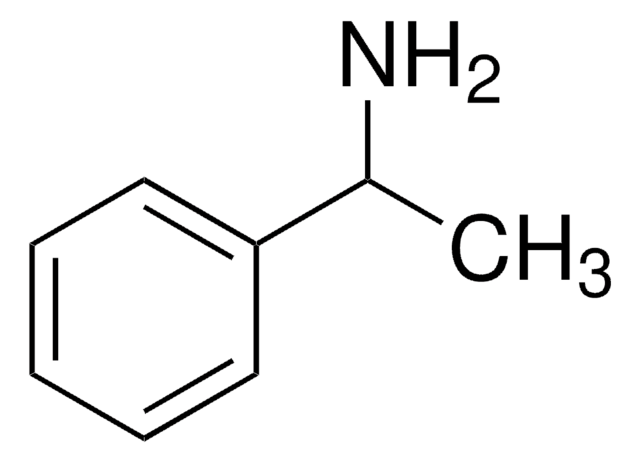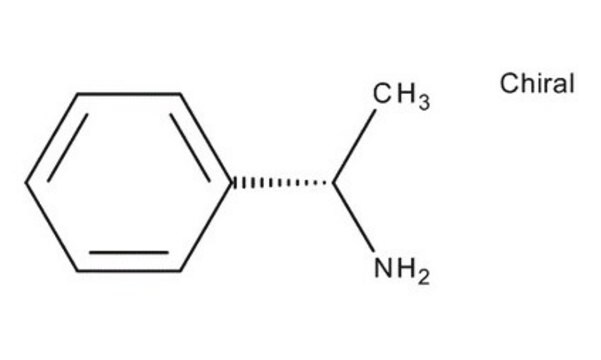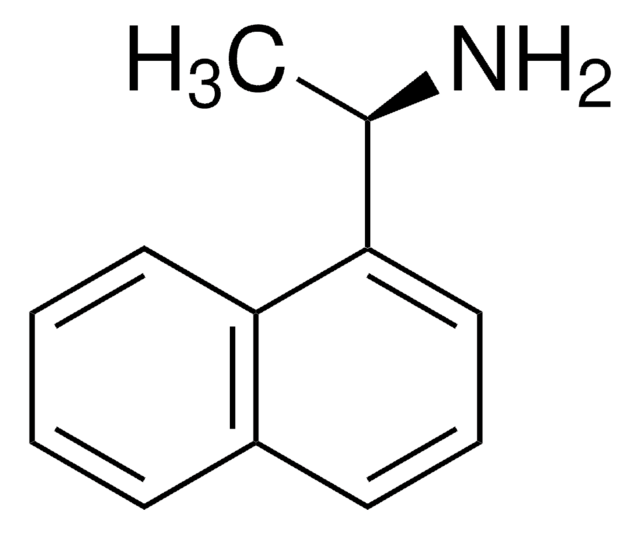115568
(S)-(−)-α-Methylbenzylamine
98%
Synonym(s):
(S)-(-)-alpha-Methylbenzylamine, (S)-(−)-1-Phenylethylamine
About This Item
Recommended Products
vapor pressure
0.5 mmHg ( 20 °C)
Quality Level
Assay
98%
optical activity
[α]20/D −39°, neat
optical purity
ee: 98% (GLC)
refractive index
n20/D 1.526 (lit.)
bp
187 °C (lit.)
density
0.94 g/mL at 25 °C (lit.)
functional group
amine
phenyl
storage temp.
2-8°C
SMILES string
C[C@H](N)c1ccccc1
InChI
1S/C8H11N/c1-7(9)8-5-3-2-4-6-8/h2-7H,9H2,1H3/t7-/m0/s1
InChI key
RQEUFEKYXDPUSK-ZETCQYMHSA-N
Looking for similar products? Visit Product Comparison Guide
Application
It can also be used:
- In the diastereoselective synthesis of S-aminonitriles.
- As a chiral auxiliary in the synthesis of (S)-(-)-N-acetylcalycotomine or (R)-(+)-N-acetylcalycotomine.
- As a chiral building block in the asymmetric synthesis of 1-substituted tetrahydro-β-carbolines.
Signal Word
Danger
Hazard Statements
Precautionary Statements
Hazard Classifications
Acute Tox. 3 Dermal - Acute Tox. 4 Oral - Skin Corr. 1B
Storage Class Code
6.1A - Combustible acute toxic Cat. 1 and 2 / very toxic hazardous materials
WGK
WGK 1
Flash Point(F)
158.0 °F - closed cup
Flash Point(C)
70 °C - closed cup
Personal Protective Equipment
Regulatory Listings
Regulatory Listings are mainly provided for chemical products. Only limited information can be provided here for non-chemical products. No entry means none of the components are listed. It is the user’s obligation to ensure the safe and legal use of the product.
FSL
Group 4: Flammable liquids
Type 3 petroleums
Hazardous rank III
Water insoluble liquid
JAN Code
115568-5G:
115568-BULK:
115568-25G:
115568-100G:
115568-VAR:
Choose from one of the most recent versions:
Certificates of Analysis (COA)
Don't see the Right Version?
If you require a particular version, you can look up a specific certificate by the Lot or Batch number.
Already Own This Product?
Find documentation for the products that you have recently purchased in the Document Library.
Customers Also Viewed
Chromatograms
Our team of scientists has experience in all areas of research including Life Science, Material Science, Chemical Synthesis, Chromatography, Analytical and many others.
Contact Technical Service









